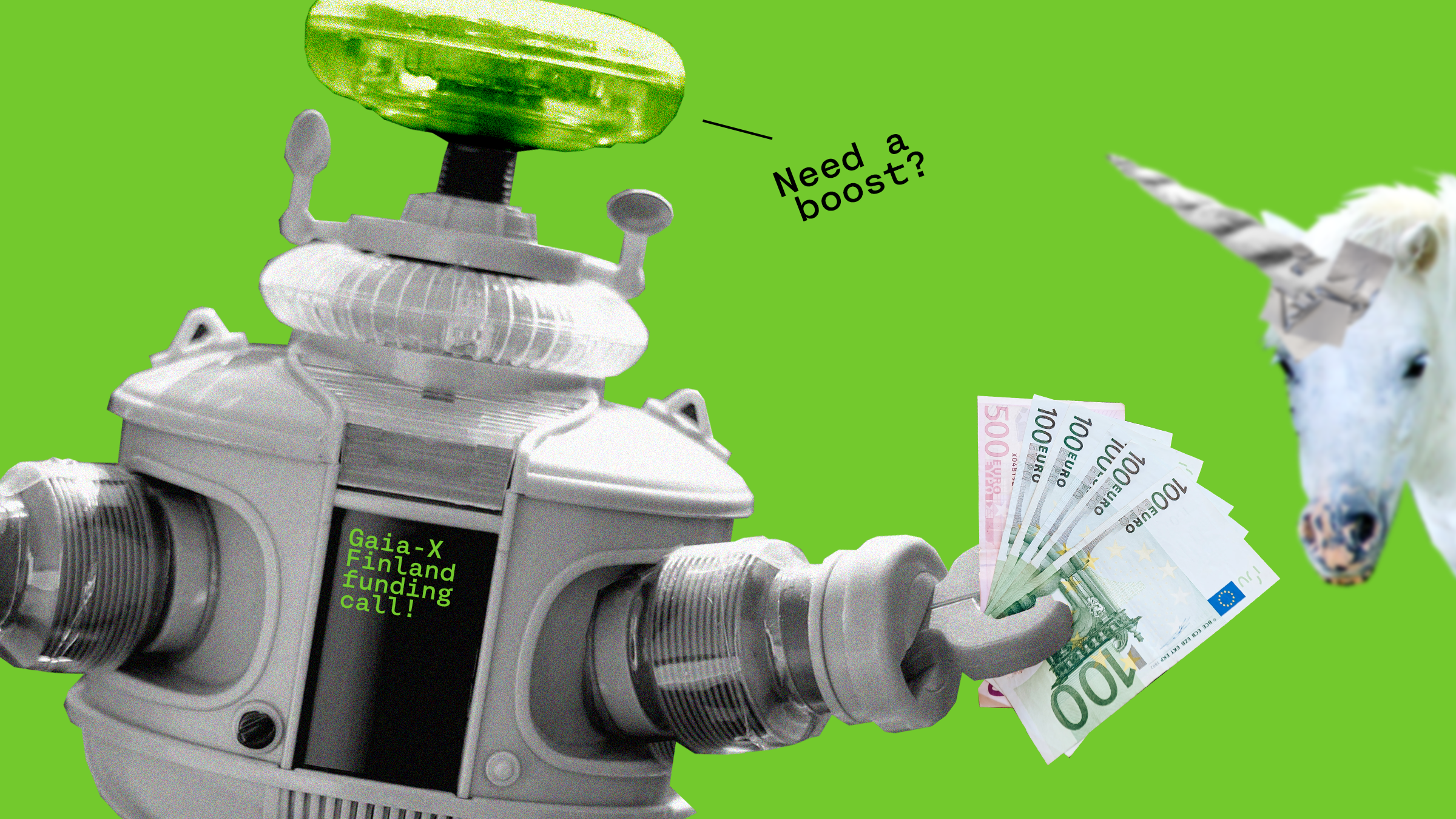The intention of Gaia-X, a European initiative, is to promote and build a federated (that is, interconnected) and secure data infrastructure to enable data to be accessed and shared and to create new value for society and businesses.
Gaia-X surfs on the major trends of decentralisation (such as web 3.0) and the shift in value creation from a single business unit to the ecosystem level.
The European Commission has projected that by 2025 the European data economy will become an 800 billion-euro business. Hence there are huge opportunities to unlock new value from data. Gaia-X is working to lay the foundation, to make this real.
The Finnish Innovation Fund Sitra builds a fairer data economy and has created tools and solutions that enable data to be shared more freely in ecosystems. Sitra is the co-ordinator of the Finnish Gaia-X network.
Sitra is looking for partners in a call for applications for project funding to find out what kind of data sharing use cases would benefit from the principles underpinning Gaia-X’s work. We also want to explore what it means to build an interoperable solution based on these principles in practice.
Principles to guide the building of data-sharing projects
The following principles can serve as a guide to building data-sharing projects and data spaces or remapping existing value chains to identify new opportunities for value creation through data. The project to be funded must address at least two of the following principles.
- Decentralisation: to support the building of an independent data infrastructure
- Standardisation: for a common understanding of structures and naming
- Interoperability: able to connect to, access and work with another dataspace
- Discoverability: data can be catalogued, searchable and reusable
- Accessibility: automated access management and open for all to join
- Common rules (sovereignty): clear, fair and transparent rules and governance for all participants
- Traceability: all transactions are recorded and logged
- Business value: unlock, create and capture the new business value at the ecosystem level
- Compliance with European data protection law: meet or exceed the standard requirements
- Usability: simple, easy and user-friendly
- Regulation by automation: the software code is readable by machine to automatically comply
- Compliance as code: the software code dictates what the users can or cannot do with the software program.
The 12 principles are a synthesis of conversations with different Gaia-X stakeholders in Finland and in Europe. They come close to the principles of a fair data economy that Sitra has developed earlier.
These 12 principles can be translated into technical and functional requirements to guide the software development phase when creating different building blocks.
Let’s have a closer look at each one of them.
1. Decentralisation of data
Decentralisation is a major shift from the current main practice of centralisation. Examples of centralisation range from the internet, where centralisation of networks or walled gardens are the mainstay, to organisations built on the premise of the industrial era where resources and infrastructures needed to be centralised to gain efficiency and economy of scale.
Supporters of decentralisation argue that this also creates a single point of failure.
However, the most compelling reason for companies to do this is the promise of decentralisation, that is, the opportunities for them to unlock new value creation. This is enabled when data can be freely accessible within an ecosystem, shifting from traditional value creation and capture that typically resides in one company to the network or ecosystem.
This makes the network more competitive and resilient. A step towards this is to build a system where data is stored and managed to allow it to be accessed, read, transformed, combined or, if needed, transferred across databases hosted by different cloud providers, data spaces or ecosystems.
Freeing the data opens up the opportunity for all participants in the network to unlock its full value.
2. Standardisation
Standardisation is a crucial part of enabling data to be shared within an ecosystem or more importantly across different ecosystems. Hence making the data interoperable.
Ideally, all data created should use the same standard or naming convention similar to those standards for measurements, volume or weight, or for electricity, such as volts or amperes. However in real life, it is more complex and data comes in different types, formats or standards. There is a need to be able to connect different systems or data spaces that might have different standards.
The Gaia-X Framework helps do this. This framework presents a set of policy rules, labelling criteria, a framework of trust and an architecture framework that enables the portability, interoperability and connectivity of infrastructure, applications and data and the delivery of services, according to and aligned with European values and norms.
3. Interoperability
The principle of interoperability is built on the principles of decentralisation and standardisation. The key motivation is to render data and data spaces interoperable so that data can move freely across these spaces if need be or accessed by different participants, devices or algorithms for the agreed purposes. Achieving interoperability opens up opportunities for new value creation by different participants in interconnected ecosystems.
4. Discoverability
This is a crucial component considering that the users of data spaces have to navigate through different data types, use cases, data spaces or data products. This requires all data to be catalogued, categorised and rendered searchable. It is somewhat similar to the indexation, sense-making and ranking work done by the Google search engine for pages on the worldwide web, only for data.
Gaia-X Federation Services offer a federated catalogue to ensure that the data or services from different providers are findable across the network.
5. Accessibility
Imagine your company has started to share its data with other companies in your value chain or local ecosystem. You probably know most of the participants either because you have met them in person or online. You have probably agreed on how you are going to share the data, what the data is for and how it will be processed. This is all good for a small group.
Now imagine you would want to open up this data to share with a wider group of participants that you have never met in person, or who perhaps come from different sectors or countries. For this, there is a need to have a module that manages the access and sets the rules or policies for the use of the data.
This would be some sort of registration, sign-up policy or identity management to allow the onboarding of new participants, enabling the system to take in, for example, 10, 100 or 1,000 users, and to be connected and scaled across different ecosystems.
6. Common rules (sovereignty)
In any lasting business relationship, collaboration needs to be built on a common objective or agreed-on rules. In a data-sharing ecosystem, such agreements or policies govern how data is being shared, the purpose for which it is being shared, the expected or foreseeable commercial value that is to be created and the manner in which this gain is to be redistributed among all participants.
Such an agreement would be drafted in a way that is fair and transparent for all participants. This is similar to Sitra’s Rulebook for a Fair Data Economy work that was carried out between 2018 and 2022.
7. Traceability
All transactions carried out within a data-sharing ecosystem need to be recorded and, if necessary, reviewed by the participants. This serves as a way to measure usage of the data space and gauge the opportunities for improving the user experience of those data spaces, service development or the redistribution of value among the participants.
8. Business value
Business value creation happens at the ecosystem level. The assumption is that if a participant can gain access to relevant data that they have never had before, it is an opportunity for them to create new value. This could be for their own benefit or for that of the larger ecosystem community and beyond.
This enables participants to create new business value that previously was not possible.
The value creation at the ecosystem level benefits the whole value network and is not limited to a single contributor. This marks a shift from creating value within a single entity to doing so within an ecosystem, and as such, increases the ability of communities, businesses and society to adapt and reform..
9. Compliance with the European data protection law
Any software, products or market development shall be built upon, at the minimum, compliance with all European data regulations or to promote the benefit of such regulations for the betterment of businesses and societal development.
10. Usability
Any services or data products that are built without putting the interests of their users at their core will face an uphill challenge in terms of user adoption. It is expected that companies who develop software should consider applying service design, user experience and interactive thinking to optimise their user journey and ease of use and increase the engagement of their users.
11. Regulation by automation
Regulation by automation refers to taking the enforcement of regulations to the next level by making software code that is machine readable, hence opening up the opportunities for automation. This is similar to the capabilities of Open Digital Rights Language (ODRL).
ODRL is a structured language to express that something is permitted, forbidden or obliged, possibly limited by some constraints. ODRL is of particular interest for computer policies, licences or any documents where modalities need to have a digital form. Sitra encourages the development of any such software.
12. Compliance as code
This approach encourages software developers to focus on writing simple and clear code that can only execute what was agreed upon in the policies, user agreements or contracts, making those policies baked into the system and enabling the amalgamation of the use cases, data spaces or systems with other ecosystems.
Sitra’s funding call
As Sitra intends to lead by example, it has allocated up to one million euros to launch a call for proposals for companies to submit their use cases and to build working digital prototypes, pilot projects or trials that adopt some of the principles listed above.
If accepted, Sitra will co-finance the development of these trials.
In addition to the principles, we recommend that you read about Sitra’s previous work on the principles of the fair data economy.
We are very excited to embark on this Gaia-X journey with you.

